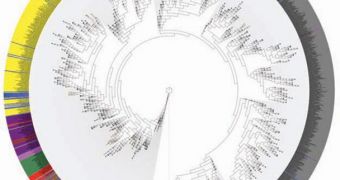The US National Institutes of Health (NIH) are currently sponsoring a five-year-long research initiative, whose aim is to make sense of the microbes and bacteria that reside on and inside our bodies. Not all microorganisms are bad for our health, and in fact we wouldn't even be alive without some cultures in our guts, that allow us to process various foods. The US Human Microbiome Project seeks to sequence the genomes of as many of these organisms as possible, and thus far about 178 such species have had their genetic information decoded. The total cost of the research is estimated to be around $157 million, Nature News reports.
Even though many of these lifeforms are really helpful for humans, sometimes their usually-harmless communities contribute to promoting the development of various diseases. Researchers in charge of the Project want to learn the precise roles that communities play in situations ranging from emerging diseases to regular digestion. Scientists are also looking for types of bacteria, viruses and fungi that may be shared by all individuals. If they discover such “common ground,” then they could begin experimenting with ways of manipulating the cultures, in order to promote healing, or additional resistance to infection.
Thus far, the initiative managed to sequence the genetic material of 178 species, but the end goal is to do the same for at least 900 species. The plan is to centralize these data, and then use them as reference point for another research, in which investigators will look for evolutionary connections in the microbiome. Knowing how various microorganisms are related to each other could help experts devise new and advanced treatments for a wide array of conditions. The completely-annotated genome sequences obtained thus far are detailed in this week's issue of the highly-regarded journal Science. The information was published by the Human Microbiome Jumpstart Reference Strains Consortium.
The paper also shows that another 178 species have been partially sequenced, with the teams behind the work scheduled to complete their full analyses soon. The results that were obtained up to this point are very promising. Scientists reveal that their techniques identified an additional 30,000 new microbial genes in the organisms they studied. “The sheer number of unique genes is impressive. They show how much novel genetic and potentially functional diversity is still buried in the human microbiome,” says Stanford University School of Medicine microbiologist David Relman.

 14 DAY TRIAL //
14 DAY TRIAL //